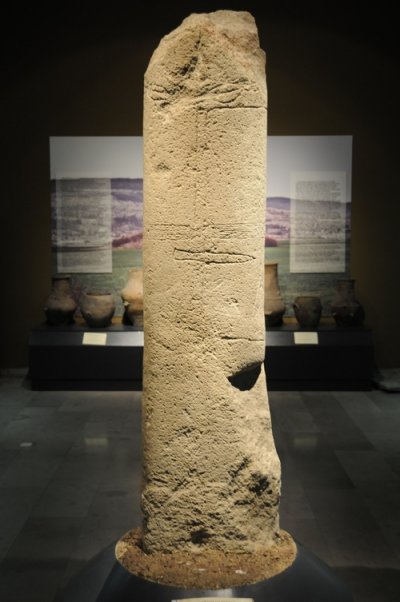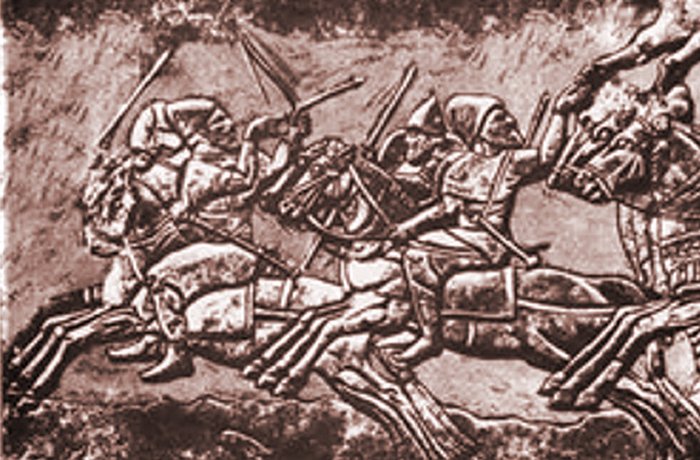Cimmerians – Ancient People Searching For A Home
David Tee - AncientPages.com - Where did the Cimmerians come from? Like most ancient societies, there is no actual knowledge of the origin of the Cimmerians.
These ancient people are supposed to be related to either Iranian or Thracians.
Belogradets, Cimmerian tombstone ca. 700 BCE–ca. 600 BCE. Credit: Varna, Museum of Archaeology, Public Domain
According to Herodotus' writings, the Cimmerians occupied the territory north of the Caucasus and the Black Sea during the 8th and 7th centuries BC (modern Ukraine and Russia).
However, archaeologists have not been able to link the Cimmerians to this specific region.
Through research, though, modern scholars have concluded that the Cimmerians may have been from modern-day Iran and migrated to the steppes of the Black Sea over time.
The Cimmerians Expanded Their Territory
As the Cimmerians began to flourish, they also entertained thoughts of expansion. Their Black Sea home was getting a little tight for their comfort, and they looked to other lands they could occupy. One battle had them defeat the King Midas of Phrygia, who appealed to Sargon II for help, but none came.
King Midas was so humiliated by the defeat that he committed suicide soon after the battle concluded. From there, the Cimmerians moved into Peloponnese and destroyed that area.
These nomadic people also made significant gains against the western empire of the Assyrians and overtook Lydia after an initial defeat.
A Cimmerian warrior (8th century BC) (reconstruction). Image credit: Internet Encyclopedia of Ukraine
One reason for their expansion efforts and desire to conquer other lands is that the Cimmerians were homeless and searching for new ground to call home. It is said that the Scythians drove them out of their original homeland in Southern Russia.
Even their excellent skills at riding horses did not save the Cimmerians from this ignoble defeat.
The Cimmerians And The Merovingian Kings
As history goes, records are lost, and myths and legends fill the void left by the absence of factual information. At one time, the kings of the Merovingian people traced their lineage to what may have been a group or one tribe of the Cimmerian people referred to as the Sicambri.
However, there is no way to tell if the Sicambri were real Cimmerians or a mythical tribe that helped the Merovingian Kings bolster their claim to the royal throne.
Early scholars also tied the Cimmerians to the Celtic people of the British Isles or an earlier version of the Germanic people of present-day Germany.
Can Cimmerians Language Shed Light On Their History?
There is little help from the literary world as the language of the Cimmerians is mainly unrecorded. There are a few names written down in the annals of Assyrian history, but that is about as far as it goes.
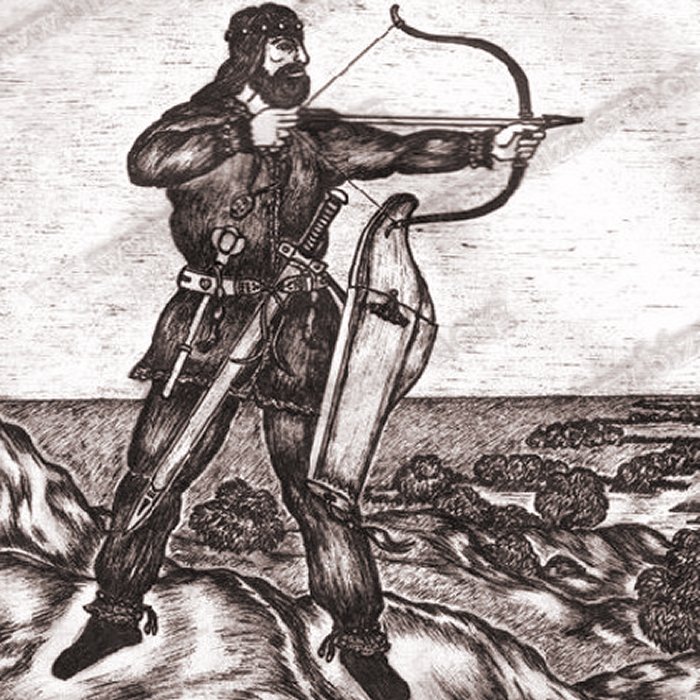
A Cimmerian warrior (8th century BC) (reconstruction). Image credit: Internet Encyclopedia of Ukraine
It is believed that the name" Cimmerians" originates from the root word 'gimer' or 'gimir.' Some have linked the Biblical term 'Gomer' to the Cimmerians.
Belgrade, Cimmerian tombstone ca. 700 BCE–ca. 600 BCE. Credit: Varna, Museum of Archaeology, Public Domain
Then there are those scholars who see the Cimmerian people as closely related to the Thracians. Their language is a bridge between the Thracians and the Iranian tongue.
Because of the failure to recover language evidence, it is challenging to trace the early history of the Cimmerians.
Cimmerians' Final Defeat
The Scythians remained their enemy despite driving out the Cimmerians from their homeland in southern Russia. They continued to defeat them well into the 7th century BC.
The Cimmerians were removed from historical records during one battle against the Lydians.
There is not much knowledge about these people after two final defeats at the hands of their enemies. Sadly, the Cimmerians' legacy is left in shambles as all we know of them come from their nomadic wars and a little art left behind in the Black Sea region.
Written by – David Tee - AncientPages.com Staff Writer
Copyright © AncientPages.com All rights reserved. This material may not be published, broadcast, rewritten or redistributed in whole or part without the express written permission of AncientPages.com
Expand for referencesMore From Ancient Pages
-
 Mysterious 70-Million-Year-Old Underground Village And Magnificent Tower Of Eben-Ezer In Belgium
Featured Stories | Mar 20, 2017
Mysterious 70-Million-Year-Old Underground Village And Magnificent Tower Of Eben-Ezer In Belgium
Featured Stories | Mar 20, 2017 -
 Bizarre Sound Of A Crash Remains An Unexplained Mystery
Featured Stories | Oct 22, 2020
Bizarre Sound Of A Crash Remains An Unexplained Mystery
Featured Stories | Oct 22, 2020 -
 Riddle Of Orkney’s Lost Tomb – Fascinating Neolithic Discovery
Featured Stories | Nov 15, 2023
Riddle Of Orkney’s Lost Tomb – Fascinating Neolithic Discovery
Featured Stories | Nov 15, 2023 -
 Statue Of Goddess Cybele Looted In The 1960s Returned To Turkey
Artifacts | Dec 22, 2020
Statue Of Goddess Cybele Looted In The 1960s Returned To Turkey
Artifacts | Dec 22, 2020 -
 How Did Climate Change Impact European Ice Age Humans?
Earth Changes | Aug 21, 2024
How Did Climate Change Impact European Ice Age Humans?
Earth Changes | Aug 21, 2024 -
 Oldest Case Of A Rare Genetic Condition Discovered
Archaeology | Aug 27, 2022
Oldest Case Of A Rare Genetic Condition Discovered
Archaeology | Aug 27, 2022 -
 Why Was The Spartan Army So Successful?
Ancient History Facts | Apr 15, 2022
Why Was The Spartan Army So Successful?
Ancient History Facts | Apr 15, 2022 -
 5,000 Years Old Beer Enjoyed By Egyptian Pharaohs Recreated
Archaeology | May 23, 2019
5,000 Years Old Beer Enjoyed By Egyptian Pharaohs Recreated
Archaeology | May 23, 2019 -
 Scottish Settler’s Ominous Encounter With A Mysterious Being In West Virginia
Featured Stories | Mar 18, 2024
Scottish Settler’s Ominous Encounter With A Mysterious Being In West Virginia
Featured Stories | Mar 18, 2024 -
 Ullr – Famous Norse Archer – God Of Asgard And Fastest Skier Ever Known Who Taught People The Art
Featured Stories | Jan 10, 2020
Ullr – Famous Norse Archer – God Of Asgard And Fastest Skier Ever Known Who Taught People The Art
Featured Stories | Jan 10, 2020 -
 Neanderthals Weaned And Raised Their Children Similarly To Modern Humans
Archaeology | Nov 3, 2020
Neanderthals Weaned And Raised Their Children Similarly To Modern Humans
Archaeology | Nov 3, 2020 -
 Evolution Of Tree Roots Led To Ancient Mass Extinctions – Geologists Say
Archaeology | Nov 11, 2022
Evolution Of Tree Roots Led To Ancient Mass Extinctions – Geologists Say
Archaeology | Nov 11, 2022 -
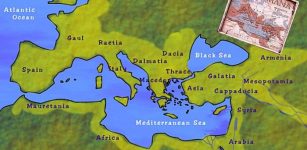 Dark And Light Sides Of Pax Romana: Great Political Slogan Introduced After Civil Wars
Ancient History Facts | May 20, 2023
Dark And Light Sides Of Pax Romana: Great Political Slogan Introduced After Civil Wars
Ancient History Facts | May 20, 2023 -
 Humans Survived A Covid-19-Like Pandemic 25,000 Years Ago
Human Beginnings | Nov 23, 2020
Humans Survived A Covid-19-Like Pandemic 25,000 Years Ago
Human Beginnings | Nov 23, 2020 -
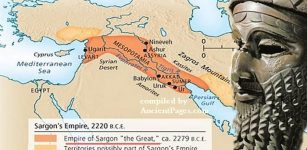 Several Climate Crises In Mesopotamia – New Study
Archaeology | Apr 28, 2021
Several Climate Crises In Mesopotamia – New Study
Archaeology | Apr 28, 2021 -
 Glass Technology Was Known In Sahara Centuries Before The Arrival Of Europeans
Ancient Technology | Jan 20, 2018
Glass Technology Was Known In Sahara Centuries Before The Arrival Of Europeans
Ancient Technology | Jan 20, 2018 -
 Unusual Tukuturi Statue On Easter Island Remains An Unexplained Mystery
Civilizations | Jan 16, 2019
Unusual Tukuturi Statue On Easter Island Remains An Unexplained Mystery
Civilizations | Jan 16, 2019 -
 Mystery Of The Brave Viking Chief Buried On The Gokstad Ship
Featured Stories | Mar 14, 2016
Mystery Of The Brave Viking Chief Buried On The Gokstad Ship
Featured Stories | Mar 14, 2016 -
 Amrita: Potion Of Immortality Consumed By Gods To Make Them Strong And Immortal
Featured Stories | Apr 5, 2019
Amrita: Potion Of Immortality Consumed By Gods To Make Them Strong And Immortal
Featured Stories | Apr 5, 2019 -
 Lost World Of Doggerland: Parts Of Britain’s Sunken Stone Age Atlantis Discovered
Archaeology | Jul 4, 2012
Lost World Of Doggerland: Parts Of Britain’s Sunken Stone Age Atlantis Discovered
Archaeology | Jul 4, 2012

